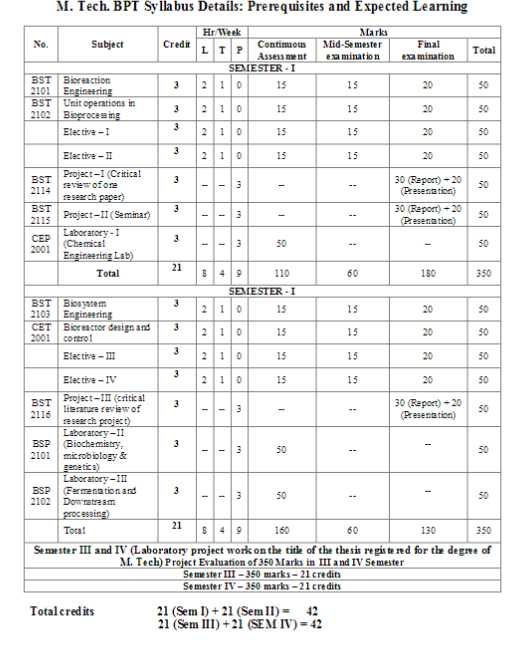|
#2
August 10th, 2017, 02:10 PM
| |||
| |||
| Re: ICT Mumbai BPT
M.Tech. (BPT) or Master of Technology in Bioprocess Technology is a two year postgraduate Biotechnology Course. Course covers connected science and natural chemistry, sub-atomic science and bio sub-atomic building, bio catalysis and biotransformation, combinatorial science, microbiology and metabolic designing, pharmaceutics and biomaterials, bioprocess control and framework building, bio detachment, biosensor and bioelectronics, cell culture building, ecological biotechnology, sustenance tech-neology, and nano-biotechnology. Confirmation: 1. Qualification: The hopeful ought to have passed the level of Bachelor of Chemical Engineering, B. Pharm, B.E./B.Tech. in substance designing/pharmaceutical/ biotechnology/life sciences/nourishment biotechnology/aging innovation/Green Technlogy of College of Mumbai OR B. Drug store, B.E./B.Tech in Chemical Designing/pharmaceuticals/biotechnology/life sciences/nourishment biotechnology/aging innovation/Green innovation of any comparable examination of a post-H.S.C. 4-year degree course of a University perceived by the UGC/AICTE/DBT and of any national/Indian Foundation of Technology, with top notch (that is, 60% of the imprints in total or identical review normal). [55% for the regressive class competitors just from Maharashtra State]. Affirmations will be done entirely on the premise of legitimacy in the substantial GATE/GPAT score and execution at the composed test directed at the UICT/ICT. 2. Outline of composed test would be with the end goal that fundamental substance designing information can be tried in Section-I, while Section-II tests for systematic aptitudes of the competitor. 3. The last legitimacy rundown would be outlined on the premise of 70% weightage to the GATE/GPAT score and 30% weightage to the composed test led by the Institute. 4. The gathering of chose hopefuls, unless chosen on a particular venture, will be given a introduction for all exploration exercises in the division and accessible undertakings for determination of ventures/direct. The last distribution of the exploration aides will be finished by the Departmental council in view of the inclinations given by the hopefuls and allowable principles/controls. Course Credit System and Structure: 1. The course is directed on a credit-based 4-semester (2-year) framework. There are two semesters in a year: July to December, semester I, and December to May, semester II. Semesters I and II will comprise of 15 four months of guidelines including a workshop/extend, 1-2 weeks of hypothesis examinations and 1-2 weeks of research facility examinations, wherever appropriate. 2. For the primary year, the semester I Examination will be held in December/January and semester II Examination will be held in May. The second year will have an examination extend based assessment in every semester conveying break even with weightage as that of the principal/second semester. The senate-affirmed calendar of scholarly exercises for the scholastic year (dates of begin and end of classes, dates of definite examinations, and so forth.) will be taken after. 3. A specific quantum of work measured as far as credits is characterized for each course. The understudy secures credits by passing courses in semesters I and II, though the examination project based assessment in semesters III and IV (second year) will add to credits proportional to that acquired in the initial two semesters. 4. Regulating of the courses in the principal year will for the most part comprise of Lectures (L) and Tutorials (T). Be that as it may, research facility courses will comprise of functional (P) hours, wherever pertinent. 5. The credit (C) for a course will be equivalent to the quantity of contact hours (L+T+P) every week for that course, that is, for 100 imprints it will be 6 and that for 50 marks it will be 3. The exploration extend based assessment will be identical to 21 credits for each semester. 6. For helping the educator in directing instructional exercises, Teaching Assistants (TA) might be given. The educator is required to illuminate TA the syllabus concealed to the point of every instructional exercise furthermore, the syllabus to be shrouded in a specific instructional exercise. The course educator is required to give issue explanations and answers for the TA. The TAs are in charge of directing the issue explanations and answers for the understudies. The course educator is additionally required to be available amid the instructional exercise session. 7. Courses are numbered in an alphanumeric way as appeared in Table 1. Center subject are mandatory. Understudies need to pick one elective from the rundown gave herewith and second can be from other office such pharmaceutical, sustenances and substance building. While picking the elective subject from office understudies should check the pre-necessities of that subject.  Contact: Institute of Chemical Technology, Nathalal Parekh Marg, Matunga, Mumbai - 400019, India Ph : +91-22-33611111/2222 |